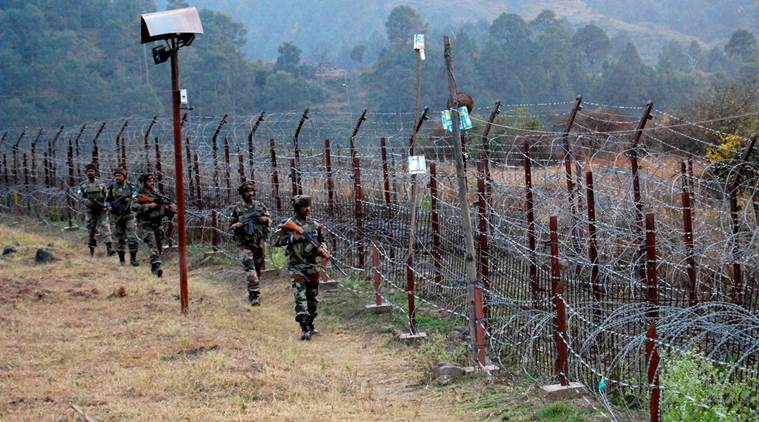Across the aisle: Muffled sounds of war drums
India does not need to get embroiled in a war. Unlike 1971, there is no pressure on India to go to the help of a restive province of Pakistan. Unlike Kargil, there is no attempt by Pakistan to grab Indian territory.

As a nation, we tend to draw a distinction between external security and internal security. For some reason, the former is permitted to wear the ‘national’ cloak but the latter is denied that privilege.
A close analysis will reveal that external security and internal security cannot be placed in two watertight compartments. The condition of one has an impact on the other. I shall, however, just flag the issue for the present.
As I write this essay on Friday before you read it, India finds itself in a war-like situation, although no one believes that there will be a full-scale war with Pakistan. We were told that Pakistan lost an F-16 aircraft and perhaps the pilot too. The government also claimed that over 300 jihadis had been killed. I am prepared to believe my government, but the world will not suspend its disbelief. India lost a MIG-21, the pilot was taken prisoner by Pakistan and later released. From the official statements, it seems that both sides are posturing and neither really wants a war.
No Need for War
India does not need to get embroiled in a war. Unlike 1971, there is no pressure on India to go to the help of a restive province of Pakistan. Unlike Kargil, there is no attempt by Pakistan to grab Indian territory. Both countries know that the trigger for the present situation was the terrorist attack on a CRPF convoy in Pulwama on February 14, 2019.
We, therefore, come back to the core issue of terror. Terrorism has grave consequences for the internal security of any country. India is no exception.
Let me list the issues that affect India’s internal security:
1. Terrorism
2. Infiltration of militants
3. Naxalism or Maoism
4. Communal/religious conflict
5. Secession or separatism
6. Reservation agitations
7. Farmers’ agitations
8. Inter-state water or boundary disputes
9. Language conflict
1. Terrorism
2. Infiltration of militants
3. Naxalism or Maoism
4. Communal/religious conflict
5. Secession or separatism
6. Reservation agitations
7. Farmers’ agitations
8. Inter-state water or boundary disputes
9. Language conflict
Terrorism Top Threat
I wrote down the issues as they came to my mind without intending any order of importance, but the order in which they appear above reflects, more or less, the gravity of the issues. The order is also an evaluation of the government’s relative success or failure in containing/resolving the issues. For instance, in 1965, the status of Hindi became an explosive issue in Tamil Nadu and the embers have not died down till this date, but, today, there is no serious language conflict anywhere in the country.
Terrorism (in Jammu and Kashmir) tops the list of issues that threaten India’s internal security. Only a few years ago it was Naxalism or Maoism; that has been contained to a large extent, if not eliminated. In the 1980s, it was separatism in Punjab but that scourge has been practically wiped out in that state.
There are valuable lessons to be learnt from the success in eliminating separatism (in Punjab) and containing Maoism (in the Naxal-affected states, including West Bengal). The lessons are (1) firmness and maximum force in dealing with the adversary and (2) fairness and a conciliatory approach in dealing with the rest of the people.
Lessons now Learnt
It has always been a puzzle to me why the Central government refuses to apply the lessons learned elsewhere to J&K. I suspect it is because of a deep-rooted animosity toward Pakistan. I have argued that the defence of the border (International Border and Line of Control) should be strengthened with more troops, and infiltration prevented. The government’s record in this regard is poor. The year 2017 witnessed a high of 136 infiltrations and, when the final numbers are out, 2018 will be worse (it was 128 at the end of October). I have also argued that the government must adopt a softer approach in the Valley and engage the stakeholders. Instead, we have the infamous muscular, militaristic and majoritarian nationalism that only drives more young men into the arms of militant groups (126 in 2017 and 164 up to October 2018). The policy is a colossal flop, it has resulted in more infiltration and more casualties.
Pakistan is a misguided, often malevolent, neighbour. Nevertheless it is a neighbouring country. As A B Vajpayee recognised and as Dr Manmohan Singh once said, ‘we can change our friends but we cannot change our neighbours’.
The BJP government has shifted the focus from terrorism to Pakistan and asks the people for unquestioning support. That will not pass muster after a few days and pertinent questions will be asked. By way of contrast, not a day passes without the Prime Minister making an unabashed political speech relentlessly attacking the Congress and the Opposition!
As far as J&K is concerned, unless the government addressed the fundamental question of alienation in the Kashmir Valley, the threat of terrorist acts in J&K will not be overcome. It will eventually acquire a larger dimension and become a national security issue.
That may be the way the BJP wants the situation to develop so that it can claim that Pakistan was ‘defeated’. That’s how the script is being written, but even carefully written scripts can throw up nasty endings. There was Kargil, there was Operation Parakram, there was the India Shining campaign, and there was A B Vajpayee. In the end the wisdom of the people handed the charge of the new government to another party and its allies.










.png)




























No hay comentarios:
Publicar un comentario